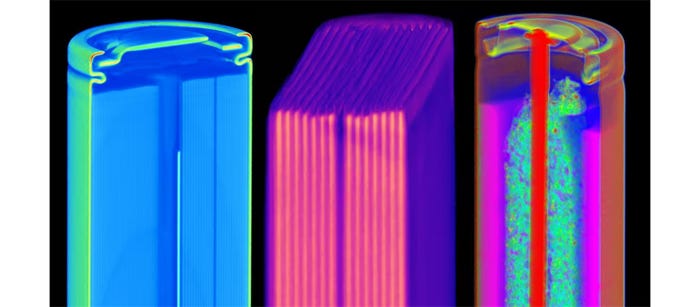How CT Scanning Improves Battery Inspection: 7 Examples
The use of industrial CT scans keeps growing. Let’s take a deeper look at the technology and its potential for battery inspections.

CT scan battery images.Courtesy of Lumafield.
An industrial computed tomography (CT) is a non-destructive inspecting technique for the examination of interior structures of objects. The technology can be used in many industrial areas, and it could be very useful when inspecting batteries before they go out to consumers.
How does an industrial CT scanner work?
Industrial CT scanners use similar technology to the ones use in a medical CT. Different X-ray images are taken from different angles and then reconstructed into a 3D model, using a special analysis software. In the specific case of an industrial CT, the X-ray source is kept stationary as well as the X-ray detector but the object to be inspected rotates inside a led shielded cabinet. Here is a short video of Lumafield's CT scanner:
What are the applications of industrial CT scans?
Industrial CT scans offer a wide range of applications such as analyzing porosity, performing CAD models comparison on CT scans, doing non-destructive metrology analysis, and even inspecting batteries. Let’s delve into the latter:
According to John Bruner, Lumafield’s head of marketing, the inspection of batteries with CT scans can fit into many stages in a battery product development and manufacturing workflow. “In the past, industrial CTs has really been restricted to industries like medical devices and aerospace. But now we are increasingly seeing the use of it in areas like consumer electronics, in validating 3D printing parts, and now in battery inspections.” Bruner said.
One reason that the use of CT scanning is becoming more widespread is because the technology is becoming accessible at a lower price point, Bruner explained. The top-of-the-line scanners required in medicine and aerospace require extreme capabilities and call for deep pockets. Lumafield is championing the idea of offering a robust, simpler machine that has all of the capability most enterprises—such as battery makers—would need, at a price they can afford. “Not every car needs to be a Mercedes,” he said by way of comparison. Industrial CT scanning provides a non-destructive method to give manufacturers and engineers accurate information about the battery's condition.
The future of industrial CT scanners for battery inspection:
The future of industrial CT scanners holds boundless possibilities. Industrial CT scans are revolutionizing non-destructive battery inspections. It is a useful tool that saves time, and it has the potential to be a game changer in the EV battery manufacturing as well.
Update: In August 2023, Lumafield co-founder Andreas Bastian presented a concise, 60-minute webinar on 'Inspecting Batteries with Industrial CT Scanners.' The webinar is available to our readers, at no charge, here.
Here are some images of industrial CT scans made by Lumafield’s CT scanner:
About the Author(s)
You May Also Like





